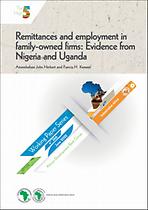Attachments [ 1 ]
More Details
The link between remittance transfers and job creation in recipient communities offers a kind of private-sector led economic growth. This link has been largely ignored in migration research. Using nationally representative panel household data collected from Nigeria and Uganda, we investigate the relationship between job creation in familyowned firms and remittances. We measure remittances as a share of household income in order to capture income and substitution effects. We find that employment of family members into family-owned firms is high in households receiving small amounts of remittances relative to their household income. As the share of remittance transfers in household income increases, the likelihood of hiring family members decreases as it increases for hired workers. The threshold point appears to occur when remittance transfers contribute more than a half of household income. The implication of our findings is that remittance transfers induce an income effect by increasing reservation wage of family members which reduces their likelihood of working in family business, which in turn opens up employment opportunities for non-family individuals. Our findings point to a sign of hidden potential of remittances to spur job creation in migrants’ communities if policies to increase the size of remittance transfers are put in place.

Comments
(Leave your comments here about this item.)